Ikram Mohammad Ibrahim: Malaysia-Pakistan: An enduring partnership and brotherhood
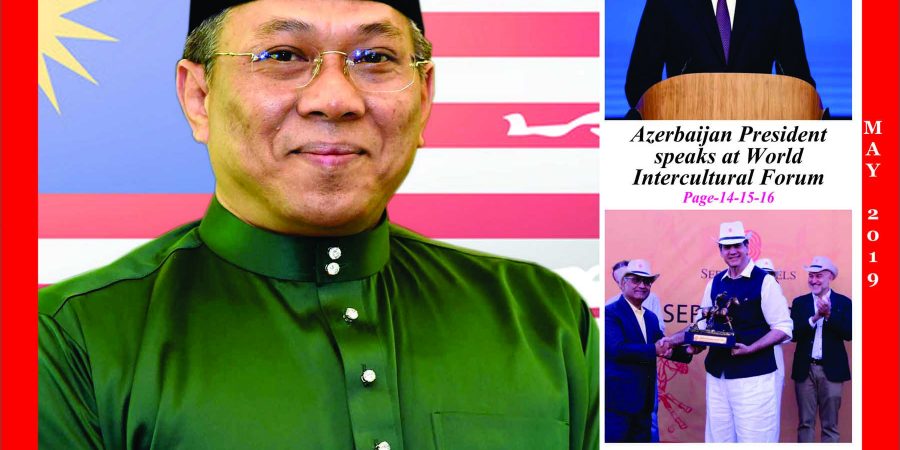
High Commissioner of Malaysia H.E. Ikram Mohammad Ibrahim talks to Centreline and DNA
By Ansar Mahmood Bhatti
The diplomatic relations between Malaysia and Pakistan was established 62 years ago, on 31 August 1957 – the date of the independence of the then-Malaya from the British. Pakistan was the 17th State that diplomatically recognised Malaya.
The struggle for the Malayan independence, which resumed in 1945 following the end of World War II, drew inspiration from the fundamental principles and ideas espoused by several great leaders of the Muslim world, including Muhammad Ali Jinnah.In addition, the late Hakim Halim bin Abdul Hamid of Pakistan made significant contributions and was instrumental in the drafting of the 1957 Constitution of the Federation of Malaya, through the British-sponsored five-member Reid Commission (1956-1957).Therefore, Pakistan is permanently etched in the genesis of Malaysia.
There has been a steady exchange of high-level visits between both countries over the past six decades. Hon. Tun Dr Mahathir Mohamad himself had undertaken four Official Visits to Pakistan, in 1984, 1997, 2002 and, most recently, from 21-23 March 2019to reciprocate the Official Visit of Prime Minister Imran Khan to Malaysia four months prior, from 20-21 November 2018. After a 12-year absence of any visit to Pakistan by a PM of Malaysia, the Official Visit by Hon. Dr Mahathir Mohamad, as Guest of Honour of the Pakistan Day 2019, has indeed generated a fresh impetus to Malaysia-Pakistan relations.
PM Mahathir Mohamad is most certainly not a stranger to Pakistan, and he remains humbled and appreciative of the genuine longstanding admiration he enjoys from the Pakistani leadership and people. The civilian awards of Nishan-e-Quaid-i-Azam and Nishan-e-Pakistan conferred on Dr Mahathir Mohamad in March 1984 and 22 March 2019, respectively are a categorical reflection of the profound appreciation by the Government and people of Pakistan on his role and contributions in forging substantive bilateral ties and towards the betterment of the Muslim Ummah and the developing world at large.
- First of all please accept our heartiest congratulation on successful visit of your Prime Minister. Both Leaders agreed that the existing relations between Pakistan-Malaysia be elevated to a Strategic Partnership. Can you please elaborate contours of this strategic partnership?
The Official Visit of PM Dr. Mahathir Mohamadof Malaysia to Islamabad from 21-23 March 2019, at the invitation of PM Imran Khan, was indeed a successful one. The primary achievement of his visit was the decision by both countries to elevate the existing brotherly relationship to the level of Strategic Partnership, considered to be long overdue – thus, opening a new chapter and orientation that will assuredly be more vibrant and dynamic.
The Malaysia-Pakistan Strategic Partnership is a tangible embodiment of the desire of both leaders tofurther deepen and expand the scope of the existing multidimensional and multilevel cooperation, in particular by capitalising on the comparative advantages and optimising the expertise that each country possess through the various existing and new mechanisms. In this regard, we will see greater governmental and private sector engagements between both sides, in particular in the area of economic cooperation, mindful also that both countries are active participants under the Belt and Road Initiative (BRI) framework of cooperation.
On the specific economic cooperation, Malaysia, which was the third largest Foreign Investor (totalling USD94 million, after China and the United Kingdom) in Pakistan for the FY2017-2018, will continue to invest in the energy, manufacturing, agriculture (especially Halal food), gemstones mining and services sectors (including telecommunications and tourism) of Pakistan. Edotco, PETRONAS, Proton and TNB are the flagship Malaysian investments in Pakistan. Malaysia is confident that its investment will again record an encouraging figure during the current FY2018-2019.
Both sides are committed to continue to take full advantage of the Malaysia-Pakistan Closer Economic Partnership Agreement (MPCEPA), signed on 8 November 2007, to increase bilateral trade, which stood at USD1.55 billion in 2018. Malaysia hopes that two-way trade will increase following the conclusion of the ongoing MPCEPA review process.
On the political,diplomatic and defence cooperation, both countries agreed to revive the Ministerial Joint Commission Meeting mechanism, proceed to convene annually the Bilateral Consultations (at the Foreign Secretary level), establish inter-Parliamentary cooperation, continue to coordinate and collaborate closely at various multilateral fora on issues of mutual concerns, and enforce the Agreement on Partial Visa Abolition. Malaysia also remains consistent in extending support towards Pakistan’s application to become a Dialogue Partner of the Association of Southeast Asian Nations (ASEAN). The existing Malaysia-Pakistan Joint Committee on Defence Cooperation (JCDC) will continue to serve as an indispensable mechanism to foster mutually beneficial long term defence partnership.
On capacity building, educational ties will be enhanced, especially in higher education as well as technical and vocational training. Currently, there are approximately 6,000 Pakistani students pursuing their undergraduate and post-graduate studies in Malaysian universities, majority of whom have been awarded with full or partial scholarships.
- Both sides also agreed for partial abolition of visa requirement for Diplomatic and Official Passport holders. If you could share some more details about this and is there any visa relaxation for businessmen and ordinary visitors?
With effect from 15 April 2019, both countries have started to issue Visa On-Arrivalfor their respective Diplomatic and Official Passport holders. For such passport holders from Pakistan, the Malaysian Immigration Department will issue them with Social Visit Pass valid for a period of 30 days for each entry. This is meant to facilitate and encourage greater engagement between the leaders and officials of both countries, in line with the newStrategic Partnership status.
For holders of Ordinary Passport, including businessmen, they are still required to apply for the necessary visa (Single Entry, 3-month validity, for up to 30 days) to be granted entry into Malaysia. In this regard, the most convenient approach is for them to submit application through the Malaysian eVisaportal (www.windowmalaysia.my), costing USD31 and approval within 48 hours – subject to certain terms and conditions. Alternatively, they may apply through the conventional method by usingour Authorised Visa DropboxAgents, list of which can be found athttp://mw.kln.gov.my/web/pak_islamabad.
- How does the PROTON plant in Karachi would further cement business relations between two countries and when exactly this plant shall be operational?
Through a joint venture with Japan, Malaysia began producing its own national car in 1985. Subsequently, Malaysia has acquired the necessary technology and expertise to indigenously develop 100% its own passenger vehicles in various classes. Currently, Malaysia is the only Muslim country that falls under this unique category and, naturally, Pakistan is an apt South Asian partner in this new win-win endeavour.
With an initial investment of USD30 million, the Proton-Al Haj Automotive assembly plant is being constructed at a Greenfield site near Karachi and is expected to be operational by the end of next year. By 2021, we will see made-in Pakistan Proton Saga, an entry-level sedan, on Pakistani roads. The plant is expected to provide approximately 2,000 direct employment opportunities in the first three years of operations, with a further 20,000 indirect jobs. This joint venture includes transfer of technology and expertise as part of Malaysia’s consistent bilateral cooperative capacity-building efforts under the South-South Cooperation framework.
The Proton-Al Haj Group joint venture was one of the primary outcomes of the Official Visit of PM Mahathir Mohamad, bearing in mind that the Proton Project is his brainchild more than three decades ago. Malaysia is confident that Proton will do well incapturing a handsome percentage in the lucrative Pakistani automobile sector.
- Malaysia’s experience and expertise in the halal industry is above board. How can Pakistan benefit from Malaysian expertise in this particular field?
The global Halal food and consumer products segment is highly lucrative, totalling approximately USD1 trillion annually.Both Malaysia and Pakistan enjoy comparative advantage in many aspects in this areas. Naturally, Malaysia stands ready to continue to share experience and best practices with Pakistan, as well as jointly collaborate in the Halal industry in a mutually beneficial manner.
Malaysia is the only country in the world whereby the Government, through the Malaysian Department of Islamic Development, provides fullest supportfor more than two decadesin promoting the Malaysian Halal Standards and Certification on consumer products and services, both domestically and internationally. This agency has developed a complete ecosystem in this regard, including through its international research academy on halal ingredients.In this regard, Malaysia will finalise in due course the necessary arrangements to facilitate capacity-building programmes for Pakistani officials.
To-date, the Malaysian Halal agency has recognised 78 foreign halal certification bodies from 45 countries, including two from Pakistan, namely the Punjab Halal Development Agency and JameaMarkazUloomIslamiaMansoora.
The annual Malaysia International Halal Showcase (MIHAS) is the world’s largest expo and conference on the Halalfood and consumer products andSyariah-compliant services industry. Malaysia welcomes the continued participation and interest of Pakistani companies in such event, which had also attracted importers from the developed world and non-Muslim countries.
As a way forward, Malaysia has expressed readiness to spearhead efforts among the Muslim countries and the global Halal industry players to unify and harmonise the Halal standards and certification requirements, with the aim to effectively capture the growing global Halal food and consumer products segment.
- Do you think Islamophobia really exists and how can we achieve harmony among various faiths, especially after New Zealand incident?
Islamophobiaor any form of religiousbigotry has no place in a civilised world and must, therefore, be vehemently rejected. No religion provides any basis to justify any form or manifestation of hatred towards the adherents of other religions or groups of individuals. The Islamophobic and Christianophobic acts of terror, such as the recent tragic incidents in Christchurch and Sri Lanka, respectively were acts of crimeagainst all humanity since such violent extremist actshad resulted in the loss of innocent lives and injury to innocent civilians, tearing apart the well-guarded socio-political fabric of the nations directly affected.
The question of Islamophobia was discussed by both Prime Ministers during their meeting on 22 March. While both countries agreed to continue to work togetherin this regard through the various intergovernmental platforms, such as the OIC and D8, we recognised the need to place a high premium on serious engagementwith the leadership of other countries, with a view to generating consensus on the most effective and sustainable way to stop, once and for all, Islamophobia and any form of religious hatred and bigotry.
As a multireligious, multiracial and multicultural country, Malaysia has a relatively strong track record in effectively managing the relations among its various ethnic communities. In Malaysia’s experience, the key ingredients in our social unity and cohesiveness formula are a strong people-centric inclusive leadership, upholding justice and the rule of law for all, and fostering genuine social acceptance, tolerance and mutual understanding.
- Do you think OIC is doing enough to address this particular issue and other issues such as Palestine, etc.?
In spite of the criticisms levelled against it, the OIC, with a membership of 57 States, remains an indispensable inter-governmental organisation for the Muslim world. Its raison d’etreto safeguard and protect the interests of the Muslim world remains central and relevant in the current context of the rapidly changing global political and economic landscape.
The effectiveness of the OIC in addressing any given issue, including Islamophobia and Palestine, is contingent upon the cohesiveness and resolve of its Member States. The OIC Member States should continue to exert more concerted efforts to addressthe concerns of the Muslim Ummah. On the issue of Palestine, both Prime Ministers agreed to enhance constructive contributions, especially through the OIC Committee of Six on Palestine of which Malaysia and Pakistan are members.
As one of the Founding Members of the OIC, Malaysia has always been supportive of all initiatives undertaken by the organisation in fulfilling its vital role as an agent of peace and development for the benefit of the Muslim Ummah. In this regard, Malaysia believes that the ongoing initiative to reform the OIC is timely and necessary in order to ensure that it is able to enhance its relevance and repositioning itself as a requisite partner in shaping the current and future direction of the global order.
7.How do you see Pakistan’s efforts against extremism and terrorism and the Government’s recent move to relax visas? Do you think it will help improve foreign direct investment in Pakistan?
Pakistan has certainly made significant strides in combating terrorism towards achieving durable peace and security in the country.While the terrorism threats have indeed significantly been reduced, we commend the Pakistani security agencies for remaining vigilant to prevent any possible terrorist attacks. Addressing the root causes of terrorism is indispensable and, in this regard, intra-regional cooperation remains a key component and should continue to be pursued.
Malaysia too had to overcome acts and threats of terror by the Communists from 1948 until 1989. The four-decade Malaysian experience in combating and eventually eliminating terrorism had shown that a military approach alone was insufficient. The soft approach of winning the hearts-and-minds of the populace concerned as well as close collaboration with our immediate neighbouring countries were pivotal in that regard.
The recently introduced visa regime of Pakistan is a welcome move and signifies a fresh posturing by Pakistan in its renewed desire to encourage greater people-to-people interaction. ‘Seeing is believing’ and this new regime has certainly eased and facilitatedthe travel of foreign businessmen and investors to Pakistan to explore its great economic and trade potential, as well as for foreign tourists to enjoy the numerous places of interest and unique experiences that Pakistan offers. The immediate positive results of the new visa regime could only be measured once the official figures and statistics on foreign investment and tourist arrivals for the Financial Year 2018-2019 are published.
- Malaysian companies are keen to invest in Pakistan’s telecom sector as well. Can you share some details in this regard?
Malaysian companies have been investing steadily in Pakistan since the late 1970s in the areas of energy, food production, infrastructure, property development, and telecommunications. For the past four decades, Pakistan has remained one of the favourite investment destinationsin the region for Malaysian companies. For the Financial Year 2017-2018, Malaysia was the third largest Foreign Investor (totalling USD94 million, after China and the United Kingdom) in Pakistan. Malaysia is confident that its investment will again record an encouraging figure during the current FY2018-2019.
Established in 2012, edotco Group is the first integrated telecommunications infrastructure services company in Asia, providing end-to-end solutions in the tower services sector – from tower leasing, co-locations, build-to-suit, energy, transmission, and operations and maintenance. The edotco Group operates and manages a regional portfolio of approximately 30,000 towers across core markets of Malaysia, Myanmar, Bangladesh, Cambodia, Sri Lanka and Pakistan.
edotco Pakistan was established in 2015 and currently operates 1,500 towers nationwide with 110 workforce, most of whom are Pakistani telco professionals. In addition to its USD110 million investment to-date, edotco has earmarked USD250 million over the next five years to expand its business, mindful of new opportunities being offered under the Digital Pakistan agenda.
On the occasion of his visit to Islamabad, PM Mahathir Mohamad and PM Imran Khan witnessed the exchange of agreements between edotco and three of Pakistan’s major Mobile Network Operators, namely Jazz, Telenor and Zong 4G. These agreements are aimed at boosting connectivity capabilities in the country via shared telecommunication towers, and more efficient operations and energy management. This comes amidst increased bilateral cooperation between Malaysia and Pakistan where the telecommunications sector is a key area discussed by both governments.
9.Malaysian case is often quoted as the most successful model when it comes to industrial and infrastructure development; tourism promotion and poverty alleviation. How did you achieve these milestones?
In general, Malaysia’s achievements is driven by a robust ecosystem, key components of which are sound and visionary political leadership, adaptive policies and legislations, maintenance of peace and stability, establishing and preserving friendly relations with other countries, in particular our immediate neighbours, and continuous investment in socio-economic development, especially human capital.
In essence, Malaysia owes its success in its almost four-decade industrialisation journey primarily to its ability to attract and retain high value foreign investments, incentivising domestic enterprises to compete in the global market, venturing into and capturing new markets, adaptiveness to advancement in science and technology, and continuous investment in further improving the Malaysian ‘brand’.Malaysia, despite being a medium-sized economy, ranks as the 27th largest trading nation in the world – a result of our consistently pro-business, pro-investment and pro-trade policies. Our export last year totalled USD247 billion, while import was USD220 billion – registering a trade surplus for the 21st consecutive year.
In an effort to diversify the economy and be less dependent on exports, Malaysia has made substantial investment in tourism. For three decades, tourism has beenthe second largest source of foreign exchange revenue for Malaysia and contributed up to 15% to the economy. The largely successful “Malaysia, Truly Asia” tagline , which has been promoted aggressively for two decades, has truly captured the global tourism market, proven by Malaysia’s Top Ten ranking under the global tourist destinations list during the same period. Last year, approximately 26 million tourists visited Malaysia, generating a USD21 million revenue for the country. As mentioned by PM Mahathir during his visit, the prerequisites in achieving success in tourism are peace and stability in the country, efficient and well organised mechanisms, and incentives for the local tourism industry players.
Although Malaysia has done remarkably well in economic growth, poverty alleviation remains a main concern for the Malaysian Government. Several comprehensive short-, medium- and long-term policies, strategies and programmes– embodying the philosophy of economic development with equitable distribution and poverty reduction – have been formulated and implemented in this regard, primarily through the New Economic Policy (1971-1990), National Development Policy (1991-2000) and National Vision Policy (2001-2020). In essence, these policies sought to create the enabling environment for sustainable socio-economic growth through employment and capacity building, education and human capital development, healthcare and social welfare, and other incentives for the bottom 40% (B40) households, especially the rural population, with a view to attain a balanced development and to create a more united and just society. Currently, 0.6% of the Malaysian population of 30 million is living below the national poverty line, designating Malaysia as an almost poverty-free nation.
Related News
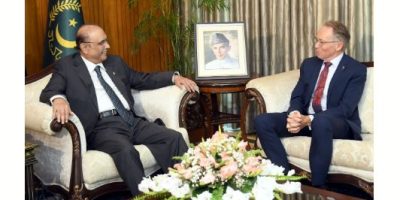
President Zardari, High Commissioner Hawkins pledge to strengthen Australia-Pakistan relations
ISLAMABAD, APR 24 /DNA/ – High Commissioner of Australia to Pakistan, Neil Hawkins, called onRead More
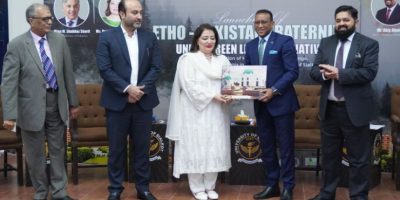
Ambassador Jemal, Climate Minister Romina launch green legacy initiative
SIALKOT, APR 24 /DNA/ – Jemal Beker Abdula, Special Envoy and Ambassador of the FederalRead More


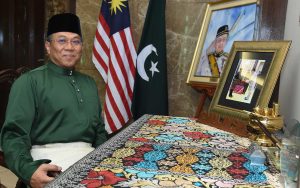
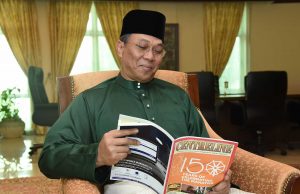
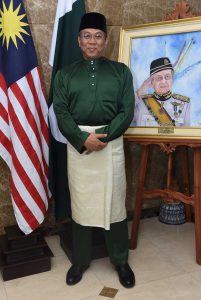
Comments are Closed